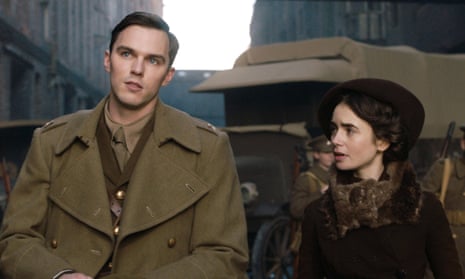A sweet innocence and high-mindedness pervade this movie from screenwriters David Gleeson and Stephen Beresford and the Finnish director Dome Karukoski. It’s about the early life of JRR Tolkien – who, like CS Lewis, became a staggeringly successful author but remained an unworldly Oxford don to the end of his days, never dreaming of the kind of mega-celebrity and super-wealth that writers such as JK Rowling or George RR Martin enjoy.
Nicholas Hoult plays the doe-eyed young John Ronald Reuel Tolkien, an orphaned boy at King Edward’s School, Birmingham, with a brilliant facility for languages who makes three good friends there (his “fellowship”) and falls shyly in love with the young woman at his boarding house, Edith Bratt (Lily Collins), but who is forced by his Catholic guardian into choosing between early marriage and going up to Oxford.
The story is told via flashbacks from his soldier’s existence at the Somme in 1916, worrying about his schoolroom comrades and agonising over the love he might have lost. There are various moments that are supposed to be goosebump-inducing premonitions of Tolkien’s future created world (at the Somme, he has a batman called Sam, played by Craig Roberts) and visions of dragons in the midst of the western front carnage. But the film, understandably perhaps, can’t reconcile his romantic and mythic vision of battle with the banal horror of the first world war.
I very much enjoyed the young Tolkien’s prewar ecstatic conversion to the world of philology at Oxford, with Derek Jacobi’s sharp-tongued professor telling him to write a 5,000-word essay on the Norse influence on Sir Gawain and the Green Knight before teatime. (Sadly, the film doesn’t show him having to do that.)
This is a very male world and perhaps the inner life of Edith remains a mystery (as perhaps it might have been for Tolkien), but its earnestness and idealism are refreshing.

Comments (…)
Sign in or create your Guardian account to join the discussion